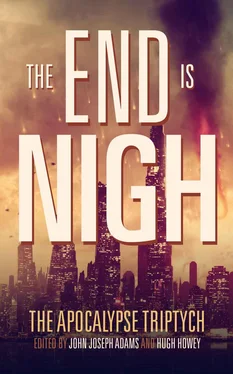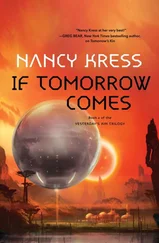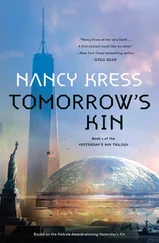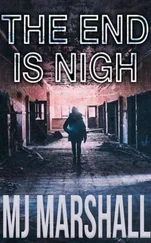Nikki looked so much like me at her age, too. That was part of the terror. Nikki was sixteen, and that was roughly the age I’d been when my symptoms had really begun to solidify. Had she managed to dodge the bullet of her genetics, or was she going to start washing the skin off of her hands any day now? No one knew. No one had any way of knowing.
“Remember I told you about the fruit from the farmer’s market going off?” asked Rachel, coming to my rescue as she had so many times before. “That mold was nasty. It needed to be cleaned up before we’d be able to cook in here again.”
Nikki glanced to the trash can, which was so clean it gleamed. “All this over a little mold?”
“It wasn’t a little mold,” I said. I was starting to feel like I should have taken a picture of the trash before taking it outside. That stuff had been growing at a rate that made me frankly uncomfortable, and for more reasons than just my OCD. I might be obsessed with cleanliness, but that didn’t make me immune to the allure of a scientific mystery. Mold that grew at that kind of rate was mysterious to be sure.
If it were legal to burn trash in our neighborhood, I would have already been looking for the matches.
“Uck,” said Nikki: her final word on the matter. She backed out of the doorway and announced, “I’ll be in my room,” then turned to prance away, flipping her hair theatrically. Rachel watched her go, waiting until the characteristic sound of a door being slammed confirmed Nikki’s retreat to her room. Only then did Rachel turn back to me, rolling her eyes. I managed to stifle my laughter.
“You’re where she gets the stomping around and slamming doors, you know,” I accused, resuming my scrubbing. “My little drama queens.”
“I had to contribute something,” Rachel said. There was a worried note in her voice. I glanced up to see her leaning in the doorway, arms folded, frowning as she watched me. “Honey…is this really about the mold? You can tell me if you’re having a bad night. I just need to know.”
I shook my head and went back to work. “I’m fine, honestly. I took my medication, and I’m not having trouble breathing.” Asthma-like symptoms were often my first warning of a serious attack. “I just really didn’t like the looks of that mold, and I don’t want to risk it being carried through the house on our shoes. I already scrubbed down the table and the trash can.”
“Mmm-hmm.” From Rachel’s tone, I could tell that she was debating whether or not to believe me. “What about the fridge?”
The smell of the bleach was soothing. I kept scrubbing. “The fruit never went into the fridge. I did a basic check for mold or signs of spoilage, found none, and left it alone. You can check if you want, as soon as I’m done with the floor.”
“I will, you know.”
“I know.” I dropped the sponge into my bowl of sudsy water and stood, stripping off my gloves. I threw them into the trash and turned to find Rachel still looking at me with concern. I offered her a tired smile. “I’m sort of counting on it. What do you want to do for dinner?”
“How do you feel about spaghetti?” The question was neutral enough, but I understood its intent. Spaghetti was one of my triggers, and had been since Nikki was a baby. If I could tolerate irregular pasta, I wasn’t having an attack.
“Spaghetti sounds great,” I said. “Do you want me to go get some tomatoes from the garden?”
“That would be wonderful.”
“Be right back.” I stepped out of the kitchen, my bare feet feeling slightly tacky from the bleach, and kissed her cheek before starting for the back door. The floor was clean. The mold was gone. It was a beautiful evening, and it was going to be an even more beautiful night.
• • • •
Rachel’s spaghetti was, as always, fantastic. She had a real gift with the sauce, managing to combine basic ingredients in a way that was nothing short of magic to me. I could work up complex solutions in the lab, I could synthesize impossible things, but ask me to brown some ground turkey and I was lost. Even Nikki, who had been making vague noises about watching her weight—worrisome, given how slim she was and how often OCD was connected to eating disorders—ate a serving and a half.
Dessert would have been a fruit tart, had everything gone as planned. In the absence of the fruit, we had ice cream—pear sorbet for me, Ben and Jerry’s coffee with chunks for Rachel and Nikki—while we talked about our days. As always, Nikki was happy to listen to Rachel talk about painting, and began interrupting with facts about her own infinitely interesting life as soon as I started talking about what I’d been working on back at the lab. I thought about getting offended, and settled for smiling and stealing half of Nikki’s ice cream while she was distracted. Rachel’s job was more interesting to hear described: she created art, something that could be seen and touched and immediately understood without years of education and practical experience. All things being equal, I’d rather hear about Rachel’s job, too.
All in all, it was a pretty peaceful night at home. No, that’s not right. Once I shut away the dread that still lingered in the pit of my stomach over the gray mold in the kitchen, it became a perfect night. It was just flawed enough to be real, and so real I wanted to repeat it over and over again for the rest of my life. If I could have had that night a hundred times, I would have been able to die a happy woman.
That’s the trouble with perfect nights: No matter how good they are, you only ever get to live them once.
It was a work night for me and a school night for Nikki, and both of us were in bed by ten. Rachel joined me an hour or so later. I woke up when she pressed a kiss into the hollow of my throat, her lips practically burning my skin. She snuggled close, and we both dropped down into dreamland, where everything was safe and warm and nothing could ever hurt us, or change our perfect little world.
I woke to the sound of Rachel whispering my name, over and over again. “Megan,” she said, her voice tight with some arcane worry. “Megan, wake up, please, I need you to wake up now. Please .” It was the panic in that final plea that did me in, yanking me straight through the layers of sleep and back into our bedroom. There was a strange, dusty scent in the air, like something left in the back of an airless room for a long time without being disturbed.
“Rachel?” I sat upright, reaching for the lamp on my side of the bed. Light would make things better. Monsters didn’t thrive in the light.
“No! Don’t turn it on.” The panic that had woken me was even stronger now. “Megan, I…I need you to take Nikki and go next door. Call the paramedics when you get there, but don’t turn on the light.”
“What?” I squinted into the darkness. Rachel was sitting on the far edge of the bed. I could see her silhouette in the light coming through the open bathroom door. “Honey, what’s wrong? Did you hurt yourself? Let me see.”
“Oh, no.” She laughed, but the panic wasn’t gone. It laced through her laughter, turning it jagged and toxic. My heartbeat slowed for a moment, and then sped up as my own panic bloomed. “You don’t want to see, Megan, all right? You don’t want to see, and I don’t want you to see, so please, just go. Get Nikki and go.”
“I’m not going to do that. Honey, what’s wrong?” And then, God help me, I turned on the light.
Rachel was wearing her favorite nightgown, the blue satin one with the popped and faded lace flowers around the neckline. Her back was to me and her hair was loose, hanging to hide her face from view. As I watched, she sighed so deeply that her entire body seemed to sag, the delicate tracery of her spine pressing hard against her skin.
Читать дальше












